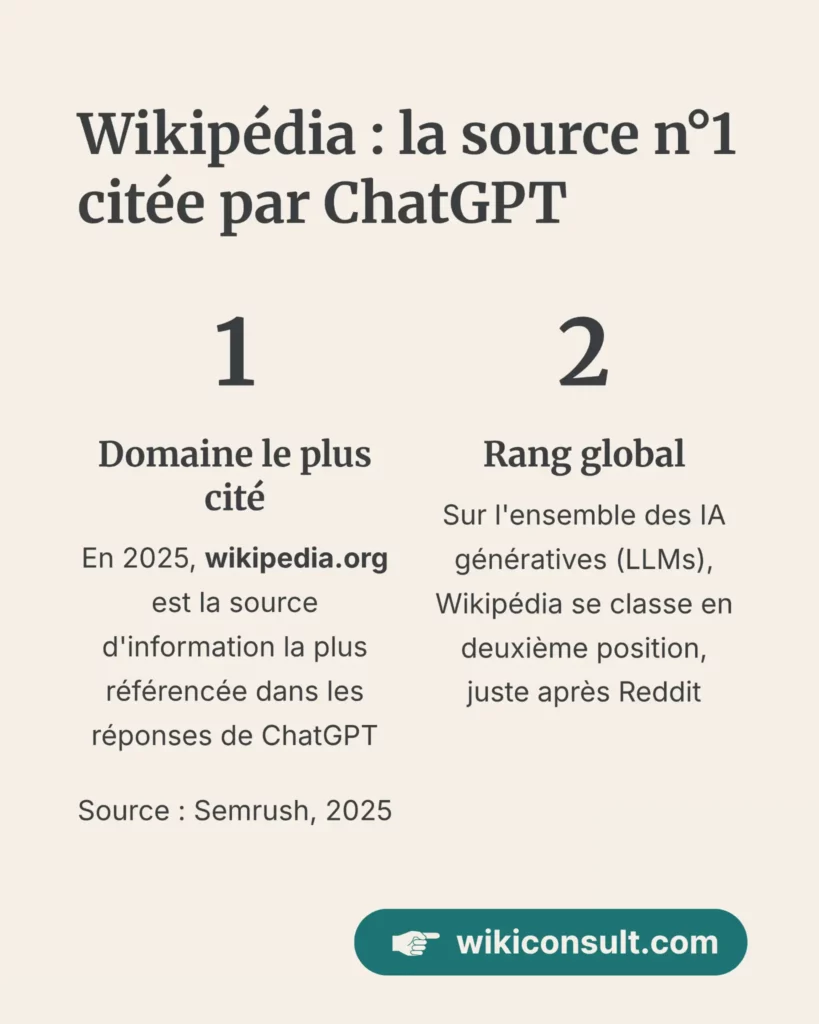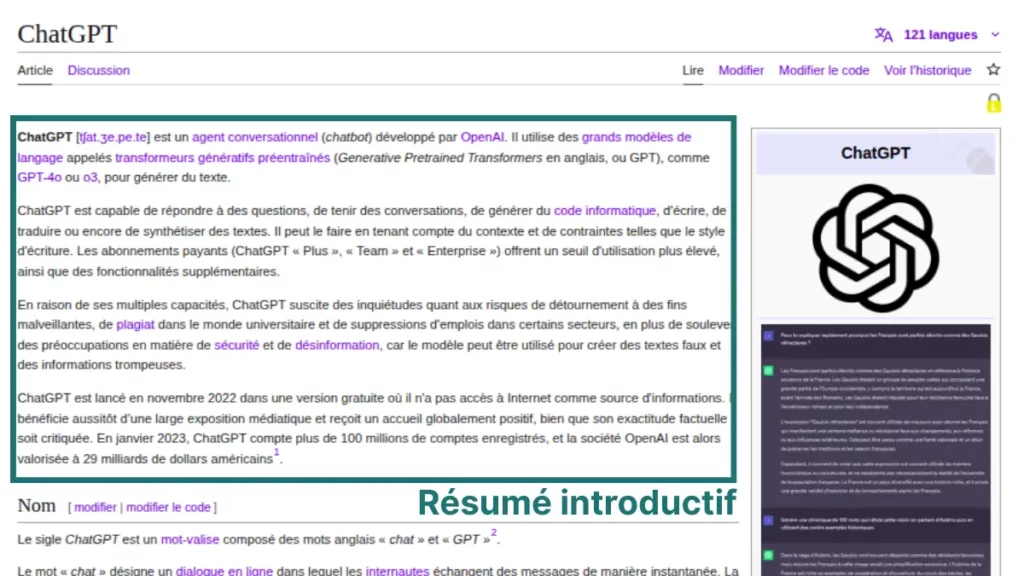Would you like ChatGPT and other LLMs to quote you more often? Would you like your website to appear as a source in their answers?
Here, I explain why your presence on Wikipedia can influence your SEO in LLMs, and how to go about it.
Plan
How do LLMs choose their sources?
When you ask ChatGPT, Gemini, Mistral, Claude or any other LLM a question, the answer doesn’t come out of nowhere. These tools have been trained on huge volumes of text from the web.
The models favor open, reliable, well-structured sources with a high degree of consensus. Wikipedia is one of the best examples:
- freely accessible,
- moderate,
- sourced,
- and “neutral”,
the encyclopedia is a reference training base for these AIs. Wikipedia content makes up 3% of GPT-3’s training data (source).
In other words: if your name, activity or expertise is on Wikipedia, you considerably increase your chances of being mentioned by an AI.
But that’s not all: some generative AIs or search modes consult and quote the web in real time. Once again, they favor high-authority sites – and Wikipedia pages (and Wikidata) are among their favorite sources.
Evidence of Wikipedia’s Impact on ChatGPT Rankings

In 2025, the wikipedia.org domain is the most cited source by ChatGPT. And the second most cited domain across all LLMs, after Reddit (source: Semrush).
What’s more, in June 2025, ChatGPT became the number one source of traffic to Wikipedia (source: Similarweb). This illustrates the extent to which users, via generative AI, continue to consult and click on Wikipedia links offered in responses, further reinforcing its perceived authority.
Third, the founder of a tool designed to track brand visibility in LLMs used it to ask 58 different questions to four major LLMs (ChatGPT, Google Gemini, Claude, and Perplexity) over four consecutive days. These questions focused on finding the best marketing agencies for specific services.
Among the top 10 agencies most frequently cited in the AI-generated answers, 50% had a Wikipedia page (source: Trackerly.ai).
These 3 elements confirm that being mentioned on Wikipedia increases the chances of appearing in the answers produced by artificial intelligences.
In a world where queries are gradually shifting from traditional search engines to AI assistants, this presence becomes a decisive visibility asset.
Do You Need a Wikipedia Page or Just Mentions to Rank in LLMs?
Having your own Wikipedia page is the ideal way to optimize your presence in LLMs, as it gives a strong signal of notoriety, legitimacy and reliability. But you still need to be eligible (see: How do I get my own Wikipedia page?).
If you’re not eligible, there are alternatives.
- Make sure you‘re cited in existing Wikipedia articles related to your field (company, project, product, personality, initiative, etc.). In the body of the text or as a source. Make sure you add quality content that’s useful to everyone and complies with editorial rules, so that it isn’t deleted in no time.
- Create your Wikidata entry.
✍️Need help making edits on Wikipedia?
We can answer your questions for free via email, or you can hire our services for personalized support on the encyclopedia. Take advantage of our 12+ years of experience on Wikipedia!
What is a Wikipedia AI Search Optimization Audit?
A Wikipedia AI Search Optimization Audit is a structured review of how your presence on Wikipedia and Wikidata can impact your visibility in large language models (LLMs) like ChatGPT, Gemini, and Claude.
Some tools, such as Profound (with new ones emerging almost every week), can track brand mentions in AI answers. But the results are highly volatile: LLM outputs change depending on the day, the phrasing of the query, and even the model version. That’s why a human-led audit is essential—to step back, analyze patterns across different tools, and provide a reliable strategy rather than a snapshot.
When we run an audit, here is what we look at:
- Page existence and eligibility – Do you already have a Wikipedia page or mention? If not, do you meet the notability criteria?
- Introductory summary strength – Are the first lines clear, well-sourced, and likely to be quoted by AIs?
- Wikidata coverage – Is your Wikidata entry complete (labels, descriptions, multilingual data, authority identifiers)?
- Backlinks and references – Are your official sources, reports, or websites correctly linked in references, infobox, and external links?
- Secondary sources – Do you have enough coverage in reliable media and publications to support your presence?
- Language versions – If you operate internationally, are you visible across relevant Wikipedia editions (English, French, German, etc.)?
This type of audit helps identify gaps that limit your chances of being cited by LLMs and search assistants. It also provides a roadmap for safe, compliant improvements on Wikipedia—whether that means strengthening your own page, securing mentions in related articles, or improving your Wikidata profile.
👀Check your eligibility on Wikipedia with a notability audit
Request a comprehensive audit from us to determine your eligibility on the encyclopedia (delivered within 48 hours) or learn about alternative options that may be more relevant for your situation.
How to Optimize Your Wikipedia Presence for LLM Visibility
You can optimize Wikipedia content to maximize the chances of it being picked up by generative artificial intelligences (LLMs).
Audit Backlinks and Strategic Links
Add links to your official sites or resources in the appropriate sections:
- infobox (official website) ;
- external links at the end of the article ;
- references or bibliography (if you have published content recognized as a secondary source).
These links, although “nofollow”, are often picked up in LLM responses, reinforcing your perceived authority.
Craft a Strong Introductory Summary
The first few lines of a Wikipedia page are the most cited by AIs, who favor content at the top of the page. This is called the “introductory summary” on Wikipedia.
Make sure they are clear, concise and well-sourced. Wikipedia regulates the type and form of content that can be included in this summary. Pay close attention to these rules to ensure that your contribution is not deleted or your account blocked.

Balance Content for Relevance and Neutrality
Structure the page with clear sections: history, activities, publications, awards, controversies…
Make sure your page is as neutral as possible. It is not possible, for example, to delete a “Controversy” or “Court case” section on Wikipedia if it is properly sourced.
Strengthen with Reliable Secondary Sources
The more your page is backed up by recognized sources (press, books, reports), the more reliable it will be considered by Wikipedia contributors and AIs alike.

Written by Albin Guillaud
A Wikipedia contributor since 2014, with Wikiconsult I support businesses, institutions, public figures, and agencies looking to create, update, or monitor their presence on Wikipedia.